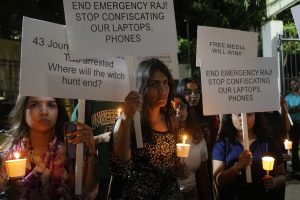On October 3, Delhi Police carried out early morning raids at the homes of 46 journalists in India’s capital New Delhi. The journalists from the online news portal NewsClick were questioned and their laptops and mobile phones were seized. Importantly, terrorism charges were slapped under the draconian Unlawful Activities (Prevention) Act (UAPA) on NewsClick founder and editor Prabir Purkayastha and its human resources head Amit Chakraborty. They were subsequently arrested.
Delhi Police, which reports to the Union Home Ministry, alleged that the portal received Chinese funds and ran an “anti-India agenda.”
The slapping of terrorism charges against journalists has been strongly denounced by media organizations. “Journalism cannot be prosecuted as terrorism,” multiple journalist organizations wrote in a letter to Chief Justice of India D.Y. Chandrachud.
This is but the latest instance of the Narendra Modi-led Bharatiya Janata Party (BJP) government’s intensifying crackdown on independent media and free speech. It also brought home the reality of why India has slid down to 161st place among 180 countries in the World Press Freedom Index 2023, falling 11 ranks in a single year.
The pretext for the raids was an article in August in the New York Times, which claimed that American tech millionaire Neville Roy Singham had funded the spread of Chinese propaganda through media outlets globally. The article claimed that NewsClick was one such media outlet.
NewsClick has denied the charges outright. Challenging the arrest of its editor, NewsClick’s counsel told the Delhi High Court, “Not a penny has come from China.”
It must be highlighted that in the Indian media landscape, where the majority of big media houses (both print and television) have been corporatized and are unquestioning of the government, small media outfits in the digital space like NewsClick are critical of authoritarian and communal policies of the BJP government. Articles on its portal have extensively covered anti-government protests, including the anti-farm law protests by farmers, the protests against the Citizenship Amendment Act (CAA), as well as the communal riots in Delhi in 2020. It was also critical of the government’s handling of the COVID-19 pandemic.
According to reports in the Indian Express newspaper, the NewsClick journalists were questioned for several hours on their coverage of the Delhi riots, the anti-CAA protests, and the farmer protests. They continue to be summoned for questioning to the Special Cell’s Lodhi Colony offices.
The brazen manner in which police raided the homes of even individual contributors to the website as well as interns, has prompted 18 journalist bodies, including various press clubs and unions, to write to Chief Justice Chandrachud, urging the higher judiciary to “intervene to put an end to the increasingly repressive use of investigative agencies” against the media. The recent crackdown, the letter stated, was an attempt to “chill the press by threat of reprisal” from a “government that disapproves their coverage of national and international affairs.”
Expressing solidarity with their media colleagues, journalist bodies protested in New Delhi and state capitals.
Within days of the terror charges against NewsClick, Jason Pfetcher, attorney and manager of Worldwide Media Holdings, the entity that invested in NewsClick, clarified in a detailed statement that there was “no foreign funding” involved. Moreover, the investment came through the sale of Singham’s tech company ThoughtWorks, he stated.
Indian authorities have been probing NewsClick since 2021 on alleged charges of money laundering. The Enforcement Directorate (ED) had raided their offices then and interrogated several staffers, including the editor.
In a recent statement on its portal, NewsClick said it had been repeatedly “targeted” by various government agencies; yet, in the past two years, the government had not been able to substantiate any of the charges and not filed a single chargesheet against them.
In an article I wrote earlier this year, I highlighted how the Modi regime was increasingly intolerant of criticism, and arbitrarily arresting journalists, activists, and political opponents.
The Modi government’s strategy has been to use central investigative agencies like the ED and the Central Bureau of Investigation (CBI) to harass and intimidate its critics, eventually forcing them to choose between being co-opted or targeted further. Opposition-ruled state governments and politicians are at the receiving end of the excesses of these central agencies.
While this is the first instance of a media organization being booked under the dreaded UAPA, journalist Siddique Kappan from Kerala was booked under the terror law earlier. Kappan was en route to Hathras in Uttar Pradesh to report on the gangrape of a Dalit woman by upper caste men when he was detained. It took two years for him to secure bail. As Kappan candidly pointed out, “Anyone who is against the government is labeled a terrorist.”
Opposition parties that are part of the INDIA bloc have hit out at the BJP government saying that it showed the latter’s growing “desperation” as elections draw near.
Congress spokesperson Supriya Shrinate said that “the Prime Minister has a special problem with those who speak the truth and ask questions.”
Early this year, the offices of the BBC in Delhi and Mumbai were raided after the organization aired a two-part documentary critical of Modi. The government banned the documentary in India.
With mobile penetration and cheap mobile data plans, there has been a marked shift in the consumption of digital news media. Several small online news media outfits have emerged over the past decade, with space for critical views and writing in the mainstream media having shrunk. Media commentators view small online media organizations as the last bastion of independent media. The raids on NewsClick were aimed at sending a stern message to this segment of independent media.
It is ironic that the BJP government, which repeatedly reminds the country of the excesses of the Emergency of 1975, brazenly displays the same tendencies of authoritarianism without even the cover of the fig leaf of a formally declared Emergency.

































